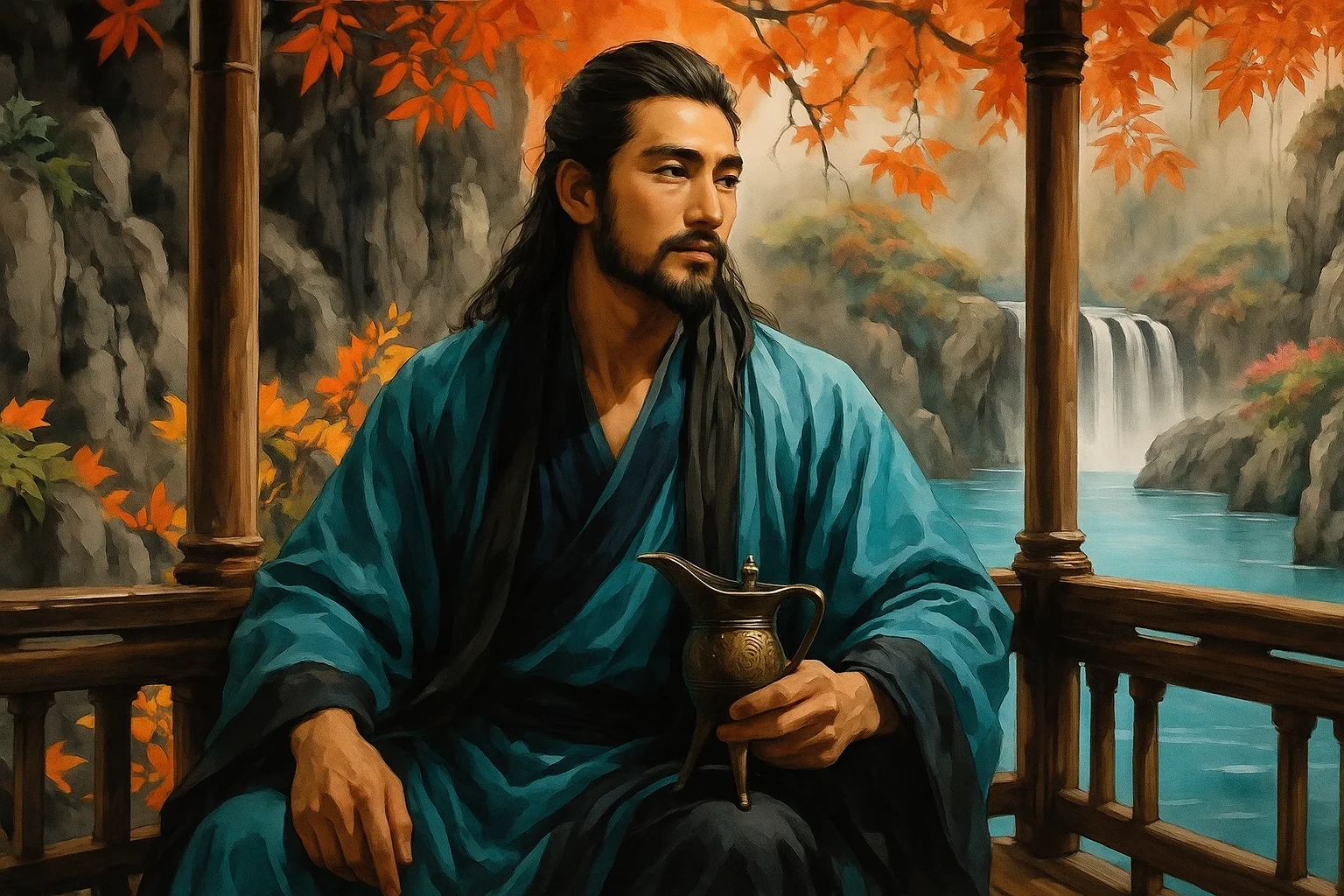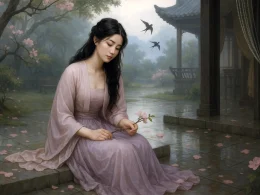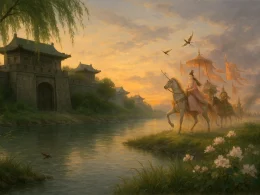Green mulberries layer the sunlit plain,
Gods of earth cheered, laughter swirls like rain.
Beyond the woods, a dove calls—showers flee;
On thatch-roof, dawn ignites apricot trees.
Original Poem
「田家」
欧阳修
绿桑高下映平川,赛罢田神笑语喧。
林外鸣鸠春雨歇,屋头初日杏花繁。
Interpretation
Composed during Ouyang Xiu's early travels in Jiangnan (date uncertain), this pastoral poem exemplifies the statesman-poet's authentic engagement with rural society. Though born to officialdom, Ouyang's provincial postings fostered profound respect for agrarian life, here captured through vibrant springtime vignettes that idealize—yet never romanticize—the harmony between human labor and natural cycles.
First Couplet: "绿桑高下映平川,赛罢田神笑语喧。"
Lǜ sāng gāo xià yìng píng chuān, sài bà tián shén xiào yǔ xuān.
Tiered mulberry greens mirror the plain's expanse—
After Earth-God rites, laughter breaks like dawn.
The opening presents ecological symmetry: cultivated mulberries (绿桑) echo the land's contours in "tiered greens," while the post-ritual laughter erupts as naturally as daybreak. The Earth-God ceremony (赛田神), far from empty tradition, embodies the peasants' pragmatic spirituality—their mirth celebrating tangible hopes for the coming harvest rather than abstract devotion.
Second Couplet: "林外鸣鸠春雨歇,屋头初日杏花繁。"
Lín wài míng jiū chūn yǔ xiē, wū tóu chū rì xìng huā fán.
Beyond woods, rain-doves call as showers cease—
Thatched roofs gilded, almond boughs release.
Meteorological precision transforms this couplet into a farmer's almanac: the turtle-doves' (鸣鸠) post-rain song signals optimal planting conditions, while the "gilded roofs" and bursting almond blooms (杏花繁) quantify sunlight's return after precipitation. Ouyang's observational rigor reveals his administrative mindset—these are not decorative details but indicators of agricultural prosperity.
Holistic Appreciation
This four-line poem blends scene and sentiment, capturing the vibrant beauty and joyous atmosphere of spring in the countryside through a dynamic interplay of movement and stillness. The first two lines depict people, portraying the lively mood of rural families after ceremonial prayers; the latter two lines paint the scenery, illustrating nature’s splendor as rain clears, flowers bloom, and birds sing. Compact in structure and bright in imagery, the poem employs simple yet fresh language to present a quintessential spring day in Jiangnan’s rural landscape. By merging natural beauty with human customs, the poet not only conveys visual charm but also evokes an idyllic way of life—where farmers live in harmony with nature, following seasonal rhythms in peace and prosperity.
Artistic Merits
Peasant Household embodies Ouyang Xiu’s signature style of "elegant simplicity," featuring accessible language, graceful imagery, and a buoyant tone. It balances scenery and narrative, using vivid details like "laughter and chatter" and "apricot blossoms in abundance" to craft an immersive ambiance. The four lines shift spatially from distance to proximity and temporally from day to dawn, creating a fluid composition with brisk rhythm. The closing couplet exemplifies the Song poetic technique of "feeling within scenery" and "meaning within painting," infusing nature’s depiction with symbolism and emotional depth.
Insights
This poem conveys an ideal of "harmony between heaven and humanity," where people revere nature, honor seasons, pray for abundance, and yet delight in labor’s quiet joys. It reminds us to cherish both our natural environment and cultural traditions, savoring life’s small wonders. Through pastoral happiness, Ouyang Xiu celebrates the pursuit of simple contentment, urging us to preserve, amid worldly clamor, a tranquil haven of hope—like this village brimming with "apricot blossoms in abundance."
About the Poet

Ouyang Xiu (欧阳修, 1007 - 1072), a native of Yongfeng, Jizhou (present-day Jiangxi Province), emerged as the preeminent literary figure of the Northern Song Dynasty. After attaining the jinshi degree in 1030, he spearheaded a literary reform movement that rejected the ornate Xikun style prevalent at court. As a mentor who nurtured literary giants like Su Shi and Zeng Gong, he laid the foundation for the golden age of Northern Song literature. Recognized as one of the "Eight Great Prose Masters of Tang and Song," Ouyang stands as the pivotal figure in the transformation of Northern Song literary culture.












